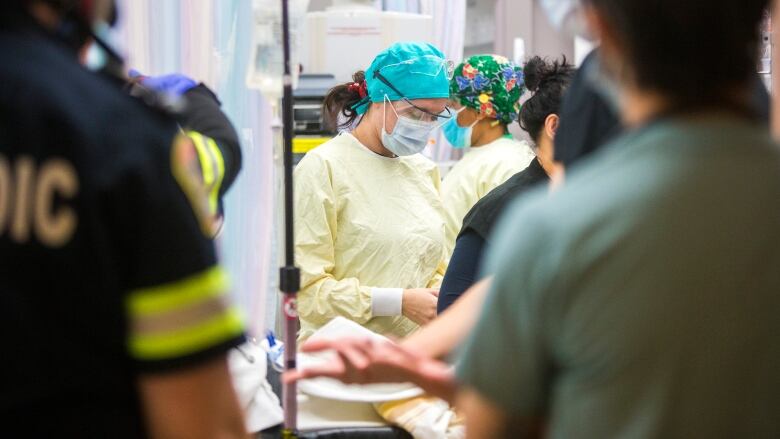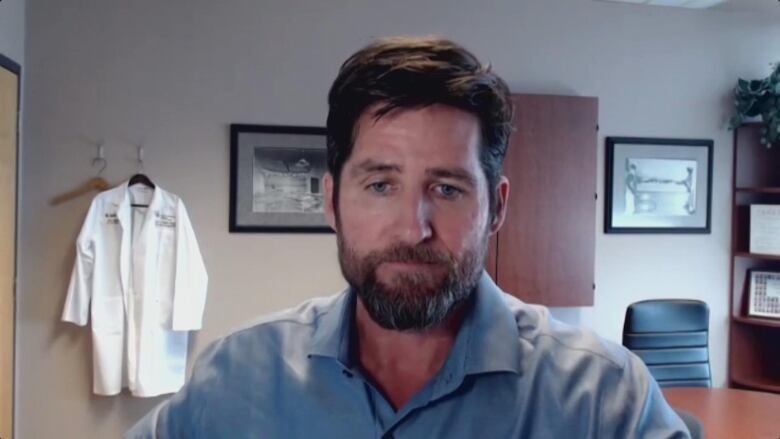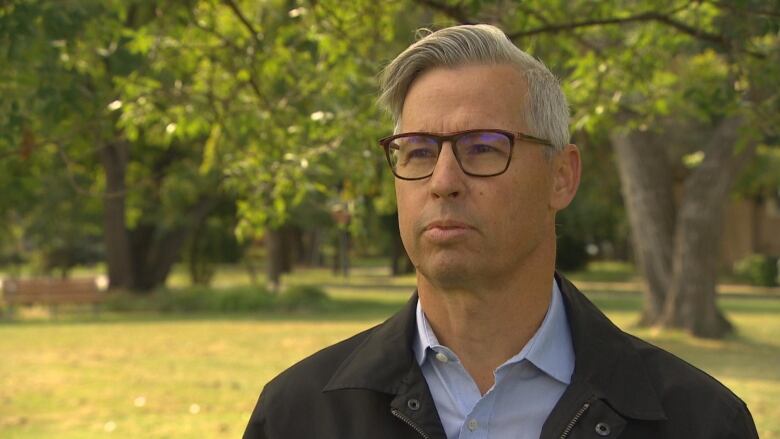Manitoba's largest hospital struggling to provide care for most ill in 'unprecedented crisis': doctors
Doctors say crunch of patients, lack of beds left patients in stretchers in Health Sciences emergency room

Manitoba's health-care system has been unable to fully staff medicine, trauma and surgery wards for months, but health-care workers say they're now facing a crisis, after thelargest emergency room in the province ran out of room over the weekend.
On Tuesday, CBC News reported that a dozen severely ill patients were lined up on stretchers in an entrance hallway at Winnipeg's Health Sciences Centre Sunday night because of a lack of space inside.
"It does feel like we have reached anunprecedented crisis in our ability to provide that acute emergency care," Dr. MerrilPauls, an emergency physician at HSCwho worked over the weekend, said Tuesday afternoon.
"Over this past weekend we've had incidences where we had two critically ill patients placed into one resuscitation bed, so literally double-bunking patients in the most acute areas of our department."
Pauls said there are disruptions to thenormal process in place for dealing with people having strokes, and he'snever seen the situation so bad.
"Their stroke is progressingparts of their brain are continuing to die because we can't get that person into a hospital bed," he said.

Dr. Shawn Young, HSC's chief operating officer, said the hospital had a lot of very high acuity patients come in this weekend,particularly on Sunday.
"There was nowhere else for them to really go," he said. "These were patients that need HSC."
The space and resource issues appeared earlier in the weekend, too.The daughter of a senior said she saw workers "stretched thin" on Friday and Saturday.
"There was disarray," said the woman, whomCBC News isn't naming as she spoke on the condition of anonymity.
Her father broke his hip in a fall and suffered other injuries on Friday. An ambulance took him to HSC's emergency room that afternoon, where he was kept on a stretcher in the hallway for three hours before being moved into a room, his daughter said.
The woman said over the course of 24 hours with her father, there wereseveral experiences she found troubling.
She asked for a cloth at one point to help clean some blood off her father butwas told "we'll be lucky if we have any clean linen," she said.
There appeared to be several open beds in the ER but not enough staff to manage them, she said, and there also seemed to be an equipment shortage.
"The incident that really frustrated mewas that they didn't seem to have enough IV machines to go around in emergency, so they took my father's to give it away to somebody else," the woman said.
"Then I had to go fight to get [another] one, and then before I knew it, they almost tried to take that one to give to somebody else."
'Mass exodus' leads to staffing shortage
Health-care workers, patients and others in the system have described ongoing barriers to care in recent years amid staffing shortages and other disruptions during the COVID-19 pandemic.
An emergency physician on staff at St. Boniface Hospital said shortages are most acute in nursing, wherea "mass exodus of epic proportions" has occurred.
"We have lost the vast majority of our senior staff, which means that we've lost any kind of institutional memory," said the doctor, who also spoke with CBC News on condition of anonymity.
He described conditions at St. Boniface over the weekend as "crushingly poor." Staff were treating multiple critically ill patients at the same time in "inadequate locations" likeresuscitation rooms, he said.
Those spaces have two beds in them but are ideally usedfor one patient at a time, specifically for critically ill patients experiencing time-sensitive interventions, he said.
"When you've got eightto 10 people around a bed trying to provide active care to critically ill people, and you have to literally duck under arms and tubing it becomes incredibly difficult to provide the quality of care that we would expect."
'Heartbreaking' for staff: Doctors Manitoba
The doctor saidhospital staff are seeingnot just more patients, but sicker patients.
Doctors Manitoba president Candace Bradshaw suggested that's tied to the pandemic,because patients haven't been able,or haven't tried, to get medical care until they're already very ill.
"It's heartbreaking for physicians and nurses and staff to work where they know someone is too afraid to even come in because [of] the wait," she said.
Bradshaw suggested a reduction of"excessive overtime" is among the steps needed toaddress burnout and retain staff.
She also used the term "unprecedented" to describe thebottleneck of patients at hospital ERs.
"I've never heard of an emergency room not having a single space to bring in one single patient from a waiting room into a treatment space," she said.

Pauls stressed that what's happening right now at HSCcan't beexplained only by a rise in acutely ill patients.
"They're not dying of improper care," he said. "They're dying as a result of decisions we're making to minimize risk to others around the department and to have that risk all reside within the department."
One way to ease the pressurewould be to see some of the most acutely ill patients treated in other parts of hospitals, he said.
Young said that'salready happening.
"We have to make sure that we're there for the most acutely in-need patients, but it does mean other patients are going to wait, unfortunately, until we can actually build up that workforce," he said.
In a statement, a government spokesperson said the province was advised of the significant demands facing HSC over the weekend.
Department leaders "worked quickly to identify available spaces and resources" and "moved staff around to care for arriving patients to ensure they received the care they needed," the statement said.
With files from Bartley Kives












_(720p).jpg)


 OFFICIAL HD MUSIC VIDEO.jpg)
.jpg)



























































































